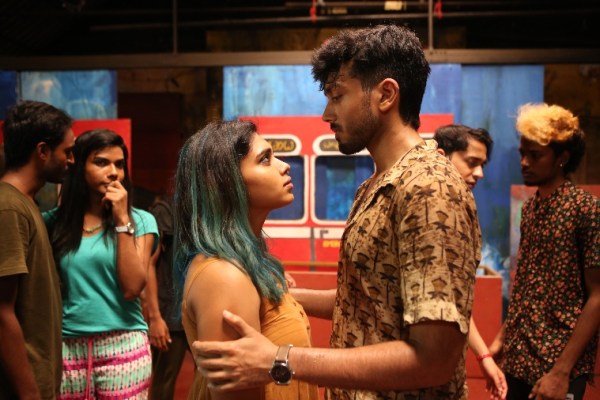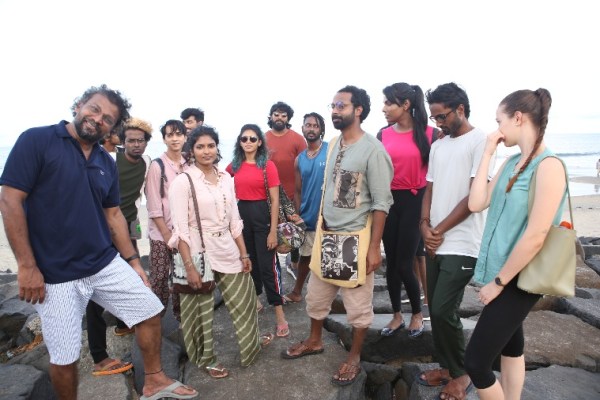 A still from Natchathiram Nagargiradhu
A still from Natchathiram Nagargiradhu“Purakanikavae mudiyaatha vetri (This victory can’t be ignored),” says Raman (Santhosh Prathap) to Kablian (Arya) in the climax of Sarpatta Parambarai. That’s what Rene (Dushara) in Natchathiram Nagargiradhu (The Star is Moving) keeps underlining about Ilaiyaraaja’s success to her boyfriend Iniyan (Kalidas Jayaram), who is not that fond of the Tamil music icon. Towards the end of the film, when Iniyan gives in and accepts the prowess of Ilaiyaraaja, Rene says something to the tune of “Othukittu thaan aaganum (Of course, you can only accept it)”. One can say the same thing about the success of Pa Ranjith in Tamil cinema. You can love or hate his films, but it is hard to ignore them. With Natchathiram Nagargiradhu, he further reinforces his place in Tamil cinema.
Natchathiram Nagargiradhu is by far his most audacious work. The film opens with the couple Rene and Iniyan lazing around in bed. While the man wants to sleep, the woman chatters about love, marriage, etc annoying him. He finally loses his cool when Rene starts singing Ilaiyaraaja songs, which leads to a heated argument. At one point, the debate turns ugly, when Iniyan hints that Rene’s appreciation of Ilaiyaraaja is motivated by her caste bias. Contextualization of Ilaiyaraaja with regards to caste politics of Tamil Nadu is the kind of audacity that seeps through this film, which is also the most unabashed and indulgent work of Pa Ranjith.
Natchathiram Nagargiradhu is the journey of a multicultural theatre group in Pondicherry, which sets out to make a play about contemporary love. As the theatre group explores the caste and gender politics of love for the play, we access the same by watching the drama that unfolds between them. It’s a tested technique – a local and modern example would be Kamal Haasan’s Uttama Villain. However, Ranjith pushes the limits here, doing away with many conventional methods of storytelling that mainstream Tamil cinema is used to. Not just the content, Ranjith has experimented with the form as well.
 Dushara and Kalidas Jayaram in Natchathiram Nagargiradhu
Dushara and Kalidas Jayaram in Natchathiram Nagargiradhu Seldom Ranjith’s craft as a filmmaker is discussed as much as his politics and ideologies. The daring experimental tone of Natchathiram Nagargiradhu is personally not surprising because there were glimpses of such eccentricity in Kaala’s ambiguous climax. With Natchathiram Nagargirathu, Ranjith has gone all out. At times, sporadic flashbacks to the formative days of Rene and Iniyan’s love story are like memories, with no details about the time and place. You know it happened a while ago, but you don’t know exactly when. You know it’s happening in a hill station, but you don’t know where. The couple goes on a bike trip, but Ranjith doesn’t bother telling you where. There is a constant tension between the two, but you don’t know the source. Ranjith strips out all unnecessary details and presents you with only the raw moments, which seems to be enough. That’s how one has to look at Shabeer Kallarakkal’s character that pops out of nowhere in the end (another screenwriting rule broken). His role might look like an easy deus ex machina to wrap up things, but giving the role a backstory and contextualizing him would become a cliché – a much worse problem in writing. Instead, he becomes a symbol of oppression. And no brownie points if you can find his obvious resemblance to a mythical character from Ramayanam.
Subscriber Only Stories
All his efforts would have fallen flat if not for the incredible actors that back the film. This is a film that largely depends on moments, which in turn depend on commendable actors. Natchathiram Nagargirathu has got a lot of them. Dushara Vijayan reflects all the complications of Rene. She keeps laughing out loud throughout the film, which is frustrating, and yet the whole point. With her immodest laughter, Ranjith brings out the innate sexism of not just Iniyan, but even the viewer. Similarly, Kalaiyarasan as Arjun is a delight to watch. He is the personification of all moralistic and populist views of the mainstream. Yet, instead of villainising him, Ranjith humanizes him. In a film that openly purports political correctness, Arjun is given a second chance. Ranjith chooses to see him as ignorant rather than as a threat. Yet, I couldn’t entirely buy into his instant transformation. There were also problems with dialogues that sounded banal and full of truisms – especially the monologue of Rene. I mean, she was telling things more eloquently without the dialogues.
 A still from Natchathiram Nagargiradhu
A still from Natchathiram Nagargiradhu The most fascinating part of Natchathiram Nagarigiradhu is the central couple. It exposes a sense of vulnerability of the filmmaker. Rene, despite being a bold and self-proclaimed Ambedkarite, is not able to move on from Iniyan, who puts her down in the name of caste. Maybe, Simone de Beauvoir was right: the cleavage of society along the line of sex is impossible. Natchathiram Nagargirathu is perhaps the first film to discuss such intricate problems between couples. While films mostly make casteism the external enemy trying to take down love, in this film, it is also internal.
Experimental films are rare in Tamil cinema. Even the ones like Kuthirai Vaal and Iravin Nizhal are mostly disregarded by the mainstream with labels like ‘off beat’, ‘cult’, and ‘parallel’. That’s why a film like Nathchathiram Nagargirathu—its commercial performance notwithstanding— from an established mainstream director is an important step forward – not just for the director’s ideological movement, but for Tamil cinema as a whole. Natchathiram is indeed nagargirathu!